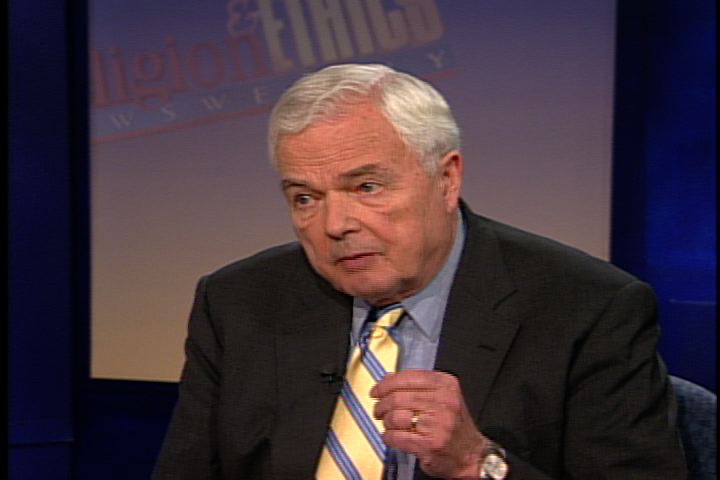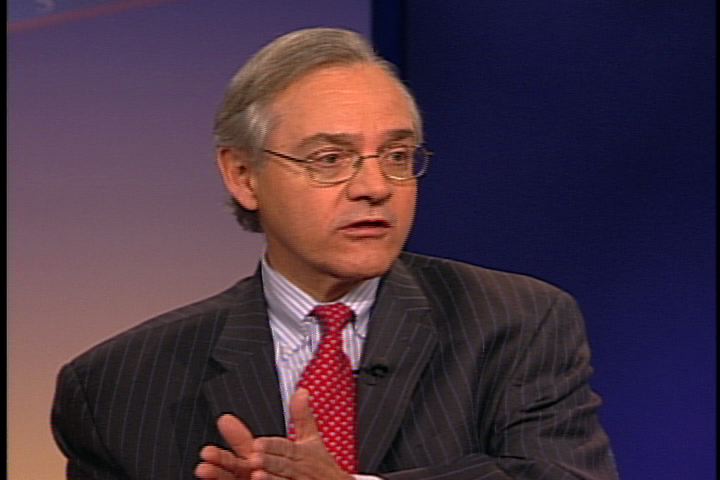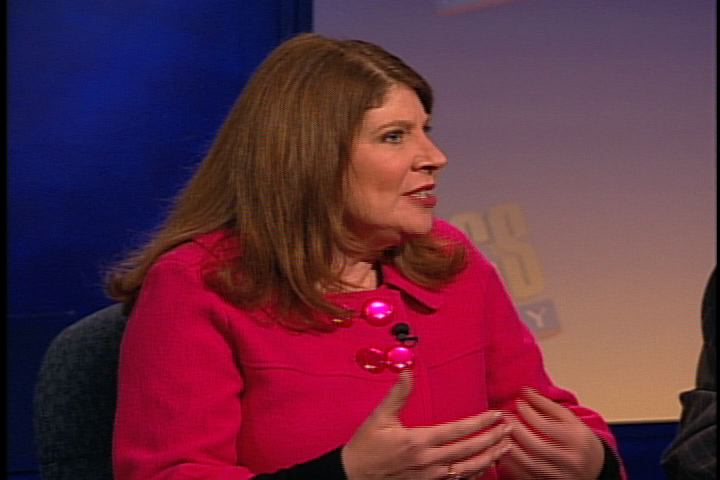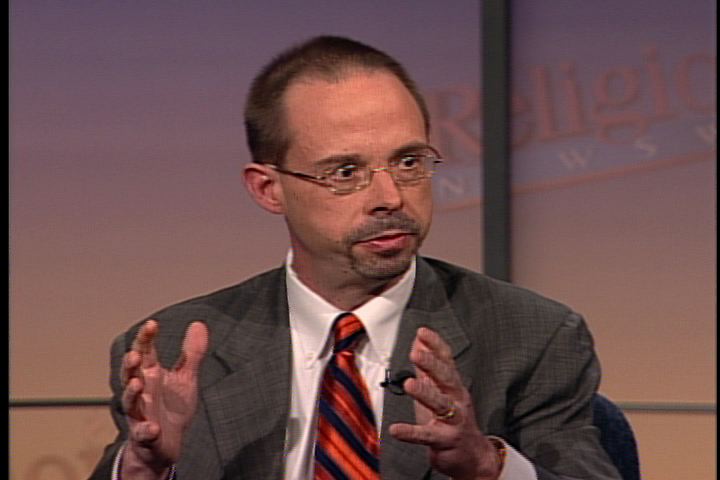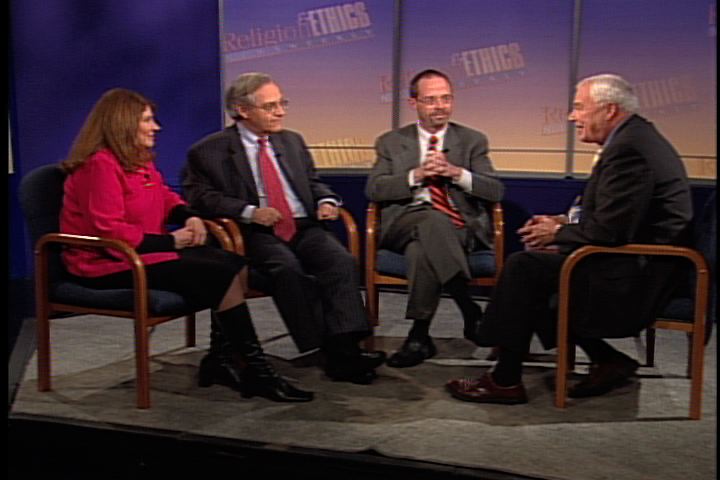In This Episode << SLIDE LEFT TO SEE ADDITIONAL SEGMENTS
Look Ahead 2009
BOB ABERNETHY, anchor: We take our annual look ahead with the help of Kim Lawton of RELIGION & ETHICS NEWSWEEKLY, John Allen, home from his beat covering the Vatican for National Catholic Reporter, and E.J. Dionne, a columnist with The Washington Post and a senior fellow at the Brookings Institution. Welcome to you all.
E.J., in three weeks we have a new administration. What should we expect?
E.J.DIONNE (Columnist, The Washington Post and Senior Fellow, Brookings Institution): You know, I don’t think in my lifetime I’ve seen such an odd disconnect between political optimism and economic gloom. That President-elect Obama has had a popularity rating now in the 70s, sometimes the high 70s, people —even people who voted against him—are looking forward to change, and yet we all know what a mess the economy is in and how many challenges he faces. You know, how do you resolve not only Iraq but Afghanistan, which is, I think, going to be a really hard problem for him? How do you pull us out of this economic mess? My friend Steve Hess at the Brookings Institution, I think, put it well: it may be a hard time to be president but it’s a great time to be a great president because great presidents come out of very difficult moments. So if he succeeds, then he has a chance of greatness if the problems don’t overwhelm him.
ABERNETHY: And what does that mean in addition to what you already talked about? What kind of programs domestically?
Mr. DIONNE: Well, Obama is blessed by having — coming into office when everyone including conservative economists are begging him to spend hundreds of trillions of dollars. That means he’s going to be able to get a lot of stuff done fast. He’s going to do a lot about health care; a lot about obviously repairing infrastructure. He’s going to put some of that money in schools and education. He can use some of the money to begin a down-payment on his health care plan. So Obama will be able to get a head-start on a lot of what he wants to do, and with a Democratic Congress, he can probably get a lot of it done.
KIM LAWTON (Managing Editor, RELIGION & ETHICS NEWSWEEKLY): It will be interesting to see, given the discourse during the campaign, the extent to which he poses these issues in moral terms. You know, he did such a great job during the campaign of framing issues, quoting Scripture and, you know, framing things on a moral level, and if he can talk about health care or some of these other economic issues in that way, I think the religious community will be very happy.
ABERNETHY: And John, what do you see of particular interest to the Vatican and to U.S. Catholics?
JOHN ALLEN (Vatican Correspondent, National Catholic Reporter): Well, I think in many ways, you know, the mega story of ’09 is going to be church-state relations under Obama — both the promise and the peril of that relationship. I think that the peril is maybe a little easier to get our hands around. It would focus on the traditional life issues. The new president has indicated he intends to sign an executive order liberalizing embryonic stem — federally funding for —embryonic stem cell research right out of the gate as part of that first 100-days package. That certainly will produce some backlash in some religious circles. I think the deeper danger is if the Democratic-controlled Congress and the Obama people were to move forward with the Freedom of Choice Act, which is this piece of legislation that’s been around a long time, and you get different readings on how realistic it is, but in effect it would eliminate existing federal and state restrictions on abortion. The U.S. Catholic bishops have certainly made clear that if that were to gain momentum we would, in some ways, be back to a very serious cultural war in this country.
ABERNETHY: To what extent — I’m sorry, go ahead.
Mr. DIONNE: I think it’s very, very unlikely that the Democrats are going to move on the Freedom of Choice Act quickly, precisely for the reasons John said — that they don’t want to start this cultural war, and I think it’s going to be very interesting to see how Obama deals with a number of issues. For example, in the last debate Obama made a very powerful statement about the need — and the consensus around the need — to reduce the number of abortions. And there is a bill in Congress — Rosa DeLauro and Tim Ryan — to reduce the number of abortions. I think that he made kind of an explicit promise to pro-life Democrats, to evangelicals who supported him, that he would move some on that front. Then the other is what he’s going to do with the faith-based office, and he’s said that he wants to reform it and keep it. And, again, I think that could be a powerful message to try to create some peace, or at least a ceasefire, in some of these culture war clashes.
Mr. ALLEN: Of course, as you know, what has really made the kind of pro-life community nervous is that comment Obama made 14 months ago on the campaign trail in ’07 speaking to the Planned Parenthood Federation, when he said that signing the Freedom of Choice Act would be the first thing he would do as president. Now his people have sort of let us know informally that we’re not to take that overly seriously. But I do think certainly the special interest community will be interested in moving forward with that. That’ll be something to watch. But Bob, I’d want to come back to the promise dimension of this relationship because I think, perhaps surprisingly to some people, there is a range of issues where I think the Vatican, certainly the Catholic bishops in the United States and other religious constituencies probably have more common ground with Obama than they did with the Bush administration in some ways. I think, principally right out of the gate, one of those issues is going to be immigration reform. This has been a huge concern for the Catholic Church in the United States, both on a social justice level — that is, they don’t like the idea that families are being broken up and so forth — but for the very practical reason that in many ways the Hispanic component of the American Catholic Church is its future. It currently constitutes about 30 percent of the Catholic population in the United States. The Catholic Church in this country would actually be contracting dramatically if it were not for the impact of immigration and higher than average Hispanic birth rates. So for reasons both prophetic and practical, I think that’s an issue where the new administration and religious communities can do some business.
Ms. LAWTON: It will be interesting to see the relationship between Obama and these religious communities — not just Catholics — that he reached out to so actively during the campaign. And particularly I’ll be watching evangelicals because, by-and-large, they did not vote for him. Younger evangelicals supported him at higher levels. But it will be interesting to see how his administration handles that and how he reaches out to those groups. Are they going to be part of the administration, or are they going to be marginalized?
ABERNETHY: John, we were all talking about abortion earlier. One question on that: to what extent does that issue trump all others for the leaders of the Catholic Church?
Mr. ALLEN: Well, the unsatisfying answer to that question is that it depends on who you talk to. I mean, if you take just the U.S. bishops conference, there’s clearly one wing of that conference — there are some 240 sitting diocesan bishops in the United States — there’s one wing of that conference that clearly believes that abortion is the towering moral issue of our age. They would compare it to the Holocaust. They would compare it to slavery. And to pretend that there’s anything else that is morally analogous to them is a kind of blindness. I think there’s another wing of the conference that certainly would be strongly pro-life but would also want to see a continuum of life issues that would include things like the war in Iraq and immigration and health care and so on. Interestingly, I think the same thing is true of the Vatican. There are some offices in the Vatican that would focus almost exclusively on the life issues — abortion having pride of place there — other offices, certainly the Vatican’s diplomatic apparatus, which has been engaged in moral critique of the war in Iraq and other issues. On December 3, the Vatican became the first state to both sign and ratify the anti-cluster bomb international treaty, which the Bush administration opposed. So, for those agencies of the Church they would have this kind of broader view, and I think that’s going to be one of those tensions that will be fascinating to watch as ’09 plays out.
ABERNETHY: E.J., let me turn to the Middle East — relations between Israel and its immediate neighbors, but that seems to be spreading out into issues that involve the whole area and beyond — Pakistan, Afghanistan.
Mr. DIONNE: Well, I think you’re right. I think the definition of what the challenges we confront start in Israel and Palestine and go all the way to Kashmir, and I think the Mumbai attack reminded us how important that battle, which we don’t talk about much, or haven’t until recently over Kashmir, is to this broader struggle. I think the Obama administration will clearly be more engaged — has signaled it wants to be more engaged — in the Israeli-Palestinian dispute and settling it. On the other hand, the situation on the ground is very complicated. There’s elections coming up in Israel. There’s almost a kind of civil war going on within the Palestinian community, but they are going to be engaged, and again, I think the biggest challenge is going to be his promise to be, to set things right in Afghanistan. I think that will be a very, very difficult challenge for the Obama administration.
ABERNETHY: And what does that mean as far as relations between the administration and the Taliban?
Mr. DIONNE: Well, there’s talk, not just among doves, of the need to engage the Taliban in some discussion by way of trying to reach some kind of settlement there. I don’t think that’s going to happen tomorrow morning, but I think we may end up moving in that direction.
Ms. LAWTON: Obama has said that he wants to improve the U.S. relationship with the Islamic world broadly, and he’s signaled that he wants to go to a Muslim capital in the world and make a speech and show that he’s interested in improving relations, which could have a lot of political implications around the world.
Mr. DIONNE: His middle name, which was a problem for some in the campaign, is a huge asset now that he’s president.
ABERNETHY: Kim, there has been vigorous — to put it mildly — reaction to the vote on Proposition 8 in California. What’s going on there and the whole gay rights issue?
Ms. LAWTON: Well, last year was a very interesting year in California. Same-sex couples got the right to marry, and a couple months later it was overturned at the ballot box, and so that set up a big struggle. It’s being argued in the courts in the next coming weeks to see what happens. The status of these thousands of marriages that did take place is a little unclear. But in the meantime, there’s a real debate going on within the gay rights community about how vocal they need to be about this. And we have seen people, you know, taking to the streets on this issue. Some of the backlash has been against religious groups — Mormons, Catholics, and evangelicals that really led the fight in California in the election. And, you know, I think the debate is how in your face, how in the streets should they be, what the strategy should be.
ABERNETHY: But there has been something that approached or was violence, wasn’t there, in that reaction?
Ms. LAWTON: Well, you know, there’s been sporadic incidents. Nothing major yet. But, you know, I think there’s been a real aggressive sign there that hadn’t been there in the past. And in a sense that vote was a wake-up call to people saying, you know, hey, in the gay community saying hey, we want to do something about this.
Mr. DIONNE: It’s such a fascinating issue because there are few issues where you can foresee change, but this is one of them. When you look at public opinion, the attitudes on this issue are so conditioned by age, and your own great survey that this show did, showed this real difference among younger evangelicals and older evangelicals on issues related to gay rights. There was no difference at all on the abortion issue — younger evangelicals were as pro-life as older ones. But on issues related to gay rights, there’s this big difference. So we are having this enormous battle now, and one can foresee that this will be much less of a fight 10 or 20 years from now. That obviously doesn’t do much good for who are gay today and would like to get married. Nonetheless, you can see where this is going.
ABERNETHY: And other denominations, Kim, are facing up to this in this coming year?
Ms. LAWTON: Well, our society is dealing with it, but inside some of the religious institutions very much so. We’ve seen this in the worldwide Anglican Communion, the U.S. Episcopal Church has been struggling with this, and it really came to a head with the consecration a gay bishop. The Episcopal Church will be meeting. They meet every three years for their General Convention, the legislative body of the church, and these issues are going to come up, and interestingly enough they’re going to be meeting in California. The Episcopal Church in California has been very — some Episcopal churches there have been marrying gay people and very much at the forefront of the gay rights issues. So these next few weeks and months are going to be very interesting in the churches, too.
ABERNETHY: John, let me turn your attention to something that — back to something that you have said. You’ve called 2009 the Year of Africa for the Vatican. What do you have in mind?
Mr. ALLEN: Well, three things, Bob. First of all, Pope Benedict XVI is going to be going to Africa in March. He’s going to be visiting Cameroon and Angola. It’ll be his first trip to the African continent since his election as pope. Second, all of the bishops of Africa are going to be meeting in Rome in September. They have an annual gathering, but they’re doing it in the West, precisely because they want to get the attention of the Western media in a way they normally don’t, when they meet in Africa. And then in October, the pope is summoning a synod, which is a gathering of Catholic bishops from all over the world, to talk about Africa and to try to put a spotlight on the issues of development and peace in Africa. All of this, of course, is against the backdrop of that Catholicism — or Africa, rather, is in many ways the greatest growth market for Catholicism in the world today. In the 20th century, the Catholic population of sub-Saharan Africa went from 1.9 million in 1900 to 139 million in 2000, which is a growth rate, Bob, of 6,708 percent, and whatever business you’re in, that’s not bad.
Mr. DIONNE: That’s quick math.
Mr. ALLEN: You know, and I think in many ways there is a belief in the Holy See that Africa represents the kind of cutting-edge of the future of the Catholic Church. So there is a real desire to consolidate those gains, but also to try to mobilize the global conscience, to do something about peace and development in Africa, in part so that the Church can continue to flourish, in part, of course, because it’s also an obvious social justice imperative.
ABERNETHY: And is it also of special concern to Obama?
Mr. DIONNE: Well, I think it is, given where he comes from, given where his dad comes from. And, you know, when you think about the amazing things that have happened, you know, the notion that the son of someone who’s a Kenyan immigrant from a nation that itself was a colony just 50 years ago is a remarkable thing. But on the Vatican’s engagement in Africa, which predates Benedict, though I think it’s a very good thing that he’s highlighting it, this is another case, to pick up on what John said much earlier on immigration, where the Church’s own interest and the need to have a prophetic voice almost perfectly overlap, because I think religious communities around the world are very focused on our obligation, global if you will — global citizens to those who are suffering in Africa and also the great potential for growth and development it Africa.
Mr. ALLEN: And I think this is also part of the reason that the Vatican in many ways responded to the election of Barack Obama noticeably more positively than some of the leadership of the American Catholic Church did, which saw the election exclusively through the lens of the life issues. I think for the Vatican particularly, given its strategic and pastoral interest in Africa, the election of an African-American president who has roots in Africa, who has enormous political capital in Africa I think strikes them as quite a positive development.
Mr. DIONNE: And I’ve said very few things over the last eight years that were terribly nice about President Bush. This is an area where he actually moved American policy in, if you will, a progressive direction. He put Africa more at the center of his foreign policy than we’ve seen in a very long time, if ever.
Ms. LAWTON: And I wanted to say, just briefly, when we were talking about the Episcopal Church, the Episcopal Church, of course, is part of the worldwide Anglican Communion, and the growth of Christianity not just in the Catholic Church but, you know, in Christianity overall, in Africa has really fueled a lot of this conflict over this gay issues and theological issues, because the churches in Africa, South America, some of those other areas — they call it the Global South — are more conservative. And as they have become bigger and gotten more power, then that has translated into more conflict with the liberal West over some of these theological issues.
Mr. ALLEN: Although just — if I can just briefly, to nuance that a bit. I think you’re right they’re more conservative on matters of sexual ethics, particularly the gay issue.
Ms. LAWTON: Right.
Mr. ALLEN: But if you change the conversation to the question such as the morality of the U.S.-led war in Iraq, such as the morality of international economic structures, there you will find a consensus of opinion in southern Christianity that by our standards is actually quite left-of-center. So it’s this intriguing mix of traditionalism on some issues and progressivism on others.
Ms. LAWTON: OK.
ABERNETHY: John, in this past year there were a number of meetings between pretty high-powered Christian scholars and Muslim scholars, all a part of the follow-up to the concerns that so many people had after the pope’s remarks in Regensburg, Germany. The Vatican leaders met with Muslim leaders to have a dialogue, and afterwards it seemed that some things came out of that suggested that the Vatican was maybe interested in talking about some practical things like who can have churches where and religious freedom, but had no interest in talking about anything to do with theology. Is that correct?
Mr. ALLEN: Well, I think the big picture is right, although I think the Vatican would fill in the details a little differently. But first of all, as a footnote this: if you ever needed proof that the Vatican is essentially uninterested in American public opinion, the fact that it scheduled this long anticipated two-years-in-the-making dialogue between Christian leaders, including the pope, and a representative sample of Muslim leaders — they scheduled it for November 4, the one day that you could guarantee that no American would pay attention at all, I think is the clincher on that deal. But look, I think what Pope Benedict XVI has tried to sketch out is a vision of the Christian-Muslim relationship that is premised on areas of political, social, and cultural cooperation rather than the fine points of competing theology. And I think at one level that’s because the pope is concerned that we might water down some of our own theological convictions to enter into this conversation. At another level, I think it’s just a practical conclusion that if you start about where your sharpest disagreements are, then you’re never going to get anywhere. Whereas if Muslims and Christians can talk about shared values — things like the dignity of the human person, the dignity of the family, the defense of human life — areas where broadly speaking they do agree, then perhaps they can get some things done. A part of that conversation, from the pope’s point of view clearly, is the issue of religious freedom, what the Vatican calls reciprocity — basically the idea being that if Muslim immigrants to the West can practice their religion freely, then religious minorities, including Christians in the world’s 56 majority Muslim societies, ought to get the same deal. This meeting at the Vatican in November did produce an agreement recognizing a right to religious freedom. I think one of the issues for Christian leaders as ’09 plays out will be to try to translate into the real world of what actually happens.
ABERNETHY: Let me — our time is almost up — we have a couple minutes left. Let me ask you to look ahead and at things that, you know, we might not normally and immediately agree on or some important things that we can expect to happen or would be looking for. Are there other things that we, you know, that’s sort of a sleeper issue or something or other — sleeper questions that we might want to anticipate as well?
Ms. LAWTON: Well, this isn’t really a sleeper issue, but I’m going to be watching as the U.S. is debating what to do about our economy and the mess and how we deal with things here — what that means for people overseas and the global crisis around the world and how much the U.S., you know, meets those needs versus domestic needs.
Mr. DIONNE: I am fascinated by something we raised much earlier, which is within the Catholic Church how will this discussion go between those who say abortion trumps everything and those who say that having that view underplays the importance of social justice and other questions. I think we’re going to see that very exclusively, and I think I’m fascinated also by what role are younger evangelicals going to play in the shaping of the evangelical churches and in the public image of evangelicalism?
ABERNETHY: John, quickly, very quickly?
Mr. ALLEN: Christian-Jewish relations — one thing we didn’t talk about at all. There were a number of flashpoints along that road in ’08. The Vatican is making some noise that they may be getting serious about the possible beatification of Pope Pius XII. I think trying to maintain that relationship while attention is in some way shifting to Islam is going to be a big challenge on both sides.
ABERNETHY: This is terrific. Thanks to John Allen and to E.J. Dionne and to Kim Lawton, and to all of you Happy New Year.

